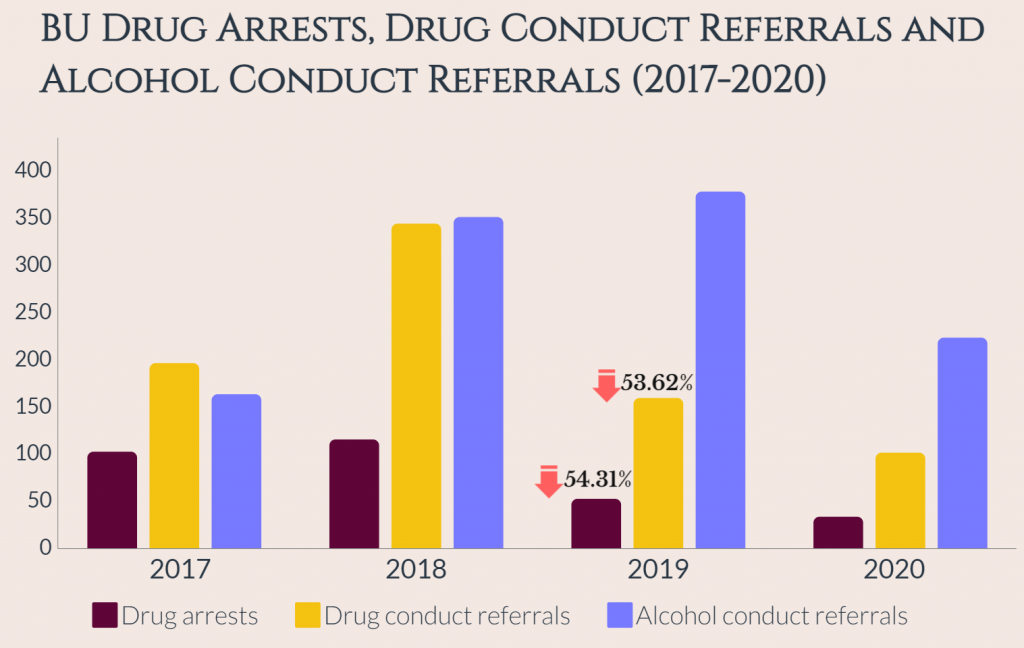Fewer criminal drug offenses were reported this year at Binghamton University than in previous years.
According to the 2021 Annual Security and Fire Report, drug arrests and drug conduct referrals at BU have been on a steady decline since 2018. During the 2019 calendar year, there were 53 drug arrests and 160 referrals made on and around University properties, compared to the 116 drug arrests and 345 referrals made in 2018. In 2020, with students being sent home amid the COVID-19 pandemic, the numbers decreased further with 34 drug arrests and 102 referrals.
The decline in these numbers followed a significant increase in both drug referrals and arrests between 2016 and 2018. In 2017, 197 drug conduct referrals were made, which would increase to 345 total referrals in 2018. In 2016, 56 drug arrests were reported, which had increased to 116 by 2018. Although drug arrests and referrals began to show a steady decrease beginning in 2019, alcohol conduct referrals did not show a decrease until the 2020 calendar year, when the number went down to 224 referrals. This was a decrease from the 379 alcohol conduct referrals in 2019, which was more than double the 164 reported in 2017.
The Annual Security and Fire report is a result of the Jeanne Clery Disclosure of Campus Security Policy and Campus Crime Statistics Act, or Clery Act, passed in 1990. The act requires most public and private United States’ colleges to submit an annual report including crime statistics from university-owned properties, according to the BU website. Andrew Baker, the Title IX coordinator and Clery Act coordinator, said that although there are no hard metrics, the most recent drop in these statistics can at least partly be attributed to the changes that occurred due to the COVID-19 pandemic.
“When [BU] went remote in March of 2020 and sent nearly all students and employees home, Clery [Act] statistics would almost have to drop because Clery [Act] only counts things that happen on University properties,” Baker wrote in email. “So, with many fewer people on the campus, a drop would be expected.”
Baker said future reports may be influenced by a variety of factors.
“The future of drug-related offenses is difficult to predict,” Baker wrote. “It is possible that a decrease will occur based on evolving New York state law or it is possible numbers will assume a more normal, pre-pandemic level.”
Jason Oppong, a resident assistant (RA) and a junior majoring in biology, said the decrease in arrests and referrals in 2020 were likely in large part due to the pandemic, but suggested efforts should be made to prevent another rise.
“To me it seems like after we surpass COVID-19, in the coming years there will be an increase in drug arrests and referrals based on past data,” Oppong wrote. “I think there should be education reform implemented to try and stop that.”
The decline in arrests and referrals had began in 2019, prior to the COVID-19 pandemic. Katie O’Keeffe, an RA and a senior majoring in biomedical engineering, said the decline may have been the result of University initiatives.
“I think that [BU] is trying to implement more harm reduction strategies in trainings and via the Alcohol, Tobacco and Other Drugs Office,” O’Keeffe wrote. “This could definitely contribute to less arrests and conduct issues and more trying to help reduce the overall harm for the individual, while also encouraging them to seek help or at least limit their drug use. I do still think that [BU] can continue to better itself particularly in regard to counseling and diversity bias.”
O’Keeffe also said that many still often stigmatize drug usage, to a point in which those experimenting with drugs are viewed as “addicts.” O’Keeffe expressed hope that the way these referrals are handled will lean toward students’ best interests in the future.
“I do think that society as a whole is starting to change its view on what ‘addicts’ are and starting to encourage more harm reduction strategies,” O’Keeffe wrote. “In my opinion, harm reduction strategies are much better than arresting everyone with drug-related incidents because it meets the person at their level and does not imply any negative connotation that arresting a person would imply.”



